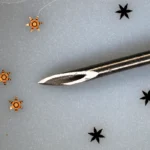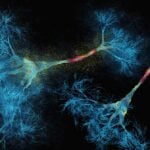INBT Welcomes Researcher Dingchang Lin
The Institute for NanoBioTechnology welcomes Dingchang Lin, assistant professor of materials science and engineering, as a new associate researcher in cell sensing. Lin’s lab focuses on innovating electronic devices and genetically encoded molecular tools for the sensing and modulation of cell dynamics in health and disease. His team strives to push biosensing spatiotemporal resolution limits and eventually realize organ-wide and single-cell mapping of cellular dynamics with high temporal resolution.
Recently, Lin and his colleagues demonstrated a revolutionary new paradigm for neural recording, where protein “ticker tape” devices were genetically encoded in live neurons to record the history of their activity for high-throughput post-termination retrieval. This strategy addresses a long-standing challenge in cellular biosensing and bioimaging in which large-scale single-cell probing, and high temporal resolution cannot be simultaneously achieved. This innovation offers an attainable path toward spatiotemporally resolved single-cell mapping of cellular dynamics across intact organs in vivo. This capability could unlock numerous possibilities in basic sciences and translational applications, including understanding the processes of development and senescence, revealing the causalities behind diseases, and assisting the drug discovery for aging, cancers, and beyond.
Lin received his bachelor’s degree in materials science and engineering from Tsinghua University in China in 2013 and his PhD in materials science and engineering at Stanford University in 2018. He then completed his postdoctoral training in chemistry and chemical biology at Harvard University. He and his team received the prestigious NIH NIGMS ESI MIRA Award, which provides $2.05 million over five years. The award will support their endeavors on tool innovations and applications for cell dynamics and mechanobiology research.
Latest Posts
-
 Johns Hopkins Postdoc Named in Forbes `30 Under 30′ List
December 8, 2025
Johns Hopkins Postdoc Named in Forbes `30 Under 30′ List
December 8, 2025
-
 Micro Grippers: David Gracias Builds Micromachines That Fold, Stick, Swim, and Sense—All Inside the Human Body.
November 20, 2025
Micro Grippers: David Gracias Builds Micromachines That Fold, Stick, Swim, and Sense—All Inside the Human Body.
November 20, 2025
-
 A bold new approach to autoimmune diseases
November 19, 2025
A bold new approach to autoimmune diseases
November 19, 2025


